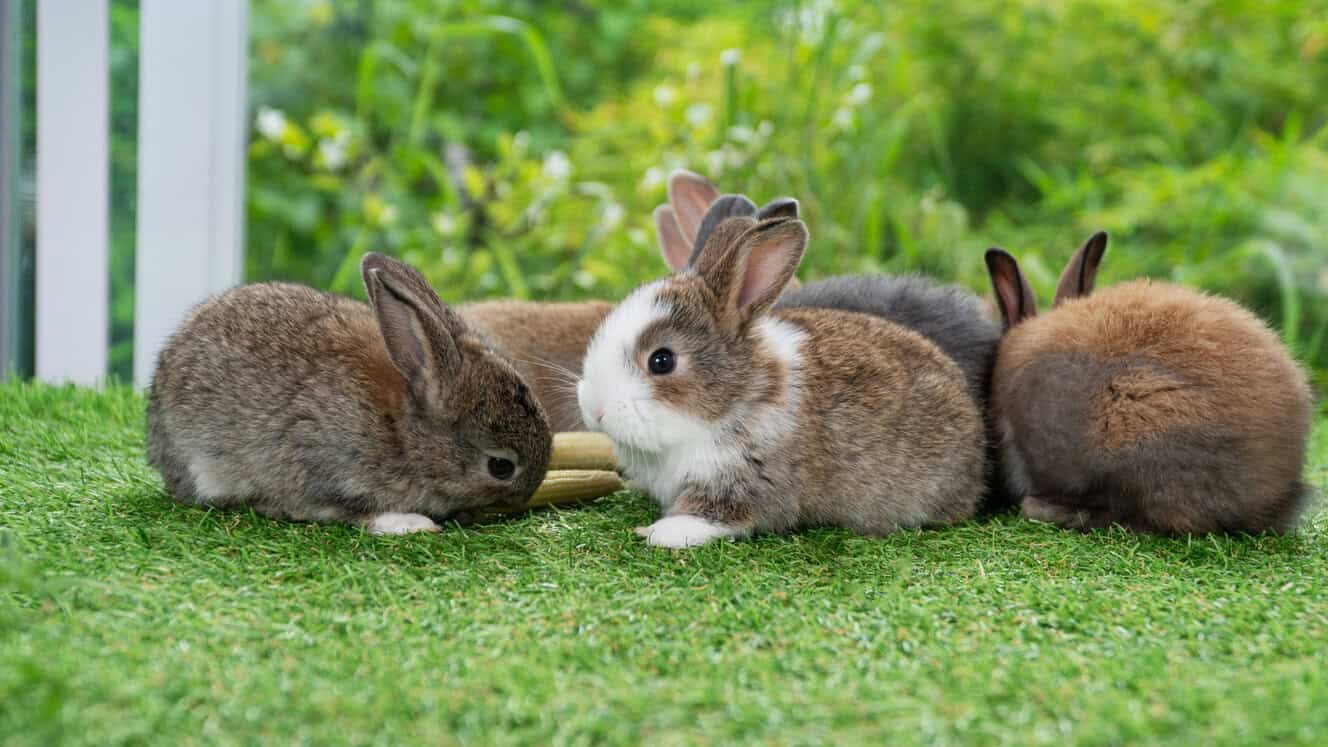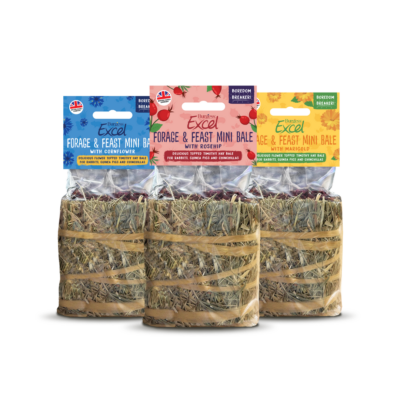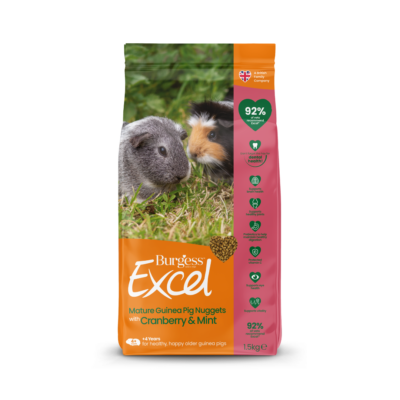
When it comes to being handled, different small pets have very different opinions. Some soon learn to enjoy it – particularly if there are some tasty treats involved! Others are not quite so keen.
Veterinary charity PDSA advises: “Some small pets love being picked up and cuddled, others prefer to be petted in their cage, and some would be happiest if you just sit back and watch their natural behaviours. Apart from ferrets and rats, who love lots of attention from their owners, most small pets won’t play games with you like a cat or a dog. This doesn’t mean they don’t make good pets – they can be fascinating to watch as they climb, dig, or build comfy nests in their cage.”
NEW! Treat your small pets to deliciously munchy Forage & Feast Mini Bales with Rosehip >>
Vet Dr Richard Black, of Rouken Glen Veterinary Surgery in East Renfrewshire, adds: “Small pets are delicate creatures. Mishandling can lead to stress, injury, or even fear, making them less sociable and harder to care for. Gentle handling helps to build trust between the pet and the handler, creating a safe and loving environment for your pet to thrive.”
Small animals and small people
Small animals are often chosen as pets for children. And, while it’s lovely for children to enjoy the company of animals, the responsibility for their wellbeing lies with adults. Small animals are often more complex to feed and care for than a cat or dog and require more looking after than a child can offer.
What are the UK’s trendiest small pet names? >>
“In the UK you need to be over 16 to legally own a pet,” says PDSA. “So, it’s important that an adult is ultimately responsible for your pet’s care. Children can learn a huge amount from pets but should always be supervised around them.”
BACK BY POPULAR DEMAND – Seasonal favourite, limited edition Winter Berry Bakes are in stock! >>
Expert tips on handling small pets
“Teaching children how to hold hamsters and other small pets gently is essential for the safety and happiness of the pets and fosters a caring attitude in young minds,” adds Dr Black. To help parents to teach their children how to become confident pet handlers, he’s compiled a really useful list of top tips:
- Use Both Hands: Always support your pet with both hands. Place one hand under their chest and the other under their hindquarters.
- Stay Calm and Quiet: Approach your pet slowly and speak softly to avoid startling them.
- Close to the Ground: When holding your pet, keep them close to the ground or over a soft surface in case they wriggle free.
- Regular Breaks: Limit handling time to a few minutes to prevent your pet from becoming stressed.
- Supervision: Always supervise young children when they are handling hamsters, guinea pigs, rabbits, and other small pets to ensure they follow the guidelines.
What puts your small pets in a good mood? >>
Dr Black also has some great ideas for how to explain gentle handling to children in ways that they can understand:
- Use Clear Language: For example: “Small pets like our hamster are very delicate. They need us to be very gentle with them, so they don’t get hurt.”
- Demonstrate First: Show your child how to hold the pet gently, using soft hands and calm movements. Let them observe a few times before they try.
- Create a Story: “Imagine if you were as small as our guinea pig. You would want people to hold you softly, right? That’s how we should treat our pets.”
- Practice with a Toy: Give your child a stuffed animal to practice gentle handling. This can help them understand the right amount of pressure to use.
- Use Positive Reinforcement: Praise your child when they handle the pet gently. Positive reinforcement will encourage them to continue the right handling technique and behaviour.
HELP YOUR PETS TO RELAX WHEN YOU’RE HANDLING THEM
Some tasty treats can really help your small pets enjoy their handling experience. For example, hay bars topped with delicious flowers are ideal for hand feeding to help a nervous guinea pig, chinchilla or bun learn to feel comfortable about being handled – and with a delectable choice of Cornflower, Marigold or Rose, you can see which hay bar they like best!
Chewable treats, such as Forage & Feast Mini Bales with Marigold or Cornflower also come in useful when it comes to grooming sessions, making this a positive, enjoyable experience for your small pets.
How to groom your guinea pigs >>
PDSA advises: “Your pet might not be used to being groomed or being touched in certain areas. Take things slowly and stop if your pet is worried or stressed. Make the grooming a positive experience, using treats and praise during and afterwards.”
Having a few Herby Hearts or Winter Berry Bakes to hand will keep your small pets occupied while you brush out their fur and check them over.
HANDFEEDING HELPS TO BUILD YOUR BOND
Handfeeding sometasty treats is a great way to build a closer bond with your little pets, helping them to associate you with good things and enhancing and enriching your relationship with them.
However, it will take time and patience – but once your small pet pals are happily accepting a tasty treat from your hand, it’s incredibly rewarding. The key is to take things slowly, so that your little chums begin to place their trust in you.
- Am I in danger? Small pets are prey animals, which means they think anything approaching is a potential predator – even you. Don’t loom over them (as a predator in the wild might), but crouch down to meet them at their level.
- What’s happening? Keep your approach slow and steady – small pets can be easily startled and will simply run for cover. Speak to them in a soft, happy voice as you gradually get closer.
- That looks like it could be tasty! Offer some food, so they learn to associate your approach with something good happening. If your pets won’t come close enough to take food from your hand, lightly toss the food to them whenever they come in your direction. Wait until they come a little closer each time before offering food again, while continuing to talk to them in a soothing voice.
- I think I’ll risk it... If your pet does take the food, sit beside them and continue chatting to them. Then, offer them another treat. If your pet looks comfortable and doesn’t back off, you could try giving them a gentle stroke. Do this every day and your pet will begin to approach you, creating some magical animal moments.
- On my own terms Most rabbits will pick this up pretty quickly, as will super smart rats, chinchillas and degus. Guinea pigs, gerbils and hamsters may take a little longer to gain confidence, but every pet is an individual and it’s essential that they choose to interact with you on their own terms – and it’s that which makes it so rewarding. When your small pet decides that he or she trusts you enough to want to engage in some hand-feeding time with you it’s a great result!
CARE MORE Find lots of useful advice on caring for your rabbits, guinea pigs, chinchillas, rats, hamsters, gerbils and ferrets from Burgess, the pet experts.
ONLY THE BEST NUTRITION FOR OUR SMALL PET FRIENDS!
Feeding the right food for their species is an essential part of small pet care. At Burgess, all our foods for small pets is made at our factory in the heart of Yorkshire, using only ingredients that meet our stringent specifications. With a long tradition of supporting British famers, we actively source all our ingredients as close to our mill as possible.
It’s no surprise that 92% of UK vets recommend our Burgess Excel small pets range!
- Check out our tasty nugget varieties specially created for junior and dwarf rabbits, indoor bunnies, golden oldies, adult rabbits – there’s even a light recipe for buns who are watching their weight!
- All Burgess Excel guinea pig nuggets, feeding hay and healthy treats are made with the finest ingredients that meet our stringent specifications and homegrown grass that’s exclusive to Burgess – no other pet food manufacturer has access to our grass!
- Burgess Excel has also developed nutrition-packed food for chinchillas and degus, hamsters, gerbils and mice, pet rats and ferrets.
And, with a fantastically nibbly range of healthy snacks available, there are all sorts of 100% natural, tasty treats to reward your small pets!
Are your small pets Burgess small pets? Join the Burgess Pet Club for exclusive offers and rewards.
12 fascinating facts you may not know about Burgess Pet Care! >>
Let’s get social...
Sign up to the Excel Bunny Base – a safe Facebook community for rabbit guardians that are looking for advice and friendly discussions from likeminded owners – and there are lots of cute bunny photos and videos!
Or why not become part of the Excel Squeak Squad on Facebook? Join Berry & Bramble, our special G-force guinea pigs, on weekly missions and fun competitions.
If you found this interesting, you may also like:
NUTRITIOUS NUGGETS – WHY THEY’RE THE BEST CHOICE FOR OUR SMALL PETS Muesli-style foods may seem like a healthy option for small pets, but this is actually not the case. Find out why nuggets are the best option when it comes to feeding your small furries...
FEEDING YOUR GUINEA PIGS – WHY THEY DON’T NEED LIFE STAGE FOOD Unlike puppies, kittens and baby rabbits, baby guinea pigs are born fully formed and eat solid food almost straight away. So, what do they need from their diet?
21 AMAZING RABBIT FACTS FOR BUNNY FANATICS Even if you’re a lifelong bunny lover, there are a few things you may not know about your hay-chomping chums.
THE SECRET TO HEALTHY, HAPPY GUINEA PIGS Guinea pigs have long enjoyed the status of being one of the most popular pets. However, in order to help them live their best guinea pig lives, it helps to see things from their perspective.
THE ULTIMATE HAPPY HAMSTER GUIDE What do your hamster chums need to be happy? Hamsters make super pets, providing you understand what’s involved in caring for these curious, active animals.
THE ULTIMATE GUIDE TO HAPPY, CHILLED CHINCHILLAS What do your chinchilla chums need to be happy and healthy? Find out with our chinchilla top tips!
THE ULTIMATE GUIDE TO HAPPY, HEALTHY DEGUS A close relative of the chinchilla, the degu is a gentle South American rodent that’s native to northern and central Chile.
THE ULTIMATE GUIDE TO HAPPY GERBILS These gentle, social rodents hail from the desert environments of Africa, India and Asia. With their soft dense coat and friendly nature, they make wonderful pets, providing you understand what’s involved in caring for these energetic animals.
THE ULTIMATE HAPPY PET RAT GUIDE Rats make excellent pets, especially for older children and adults. They’re clean, friendly, inquisitive and highly intelligent and bond well with people.
THE ULTIMATE GUIDE TO HAPPY, HEALTHY FERRETS Thanks to their endearing, cheeky character, fun-loving ferrets can make wonderful companions, providing you understand what’s involved in caring for these captivatingly curious animals.
WHY MICE ARE REALLY RATHER NICE Pet mice are epic explorers and there’s hours of fun to be had watching them as they nimbly scale ropes, pause and scent the air, nibble on tasty treats that they hold delicately in their front paws and dash recklessly through tunnels. However, these compact pets have quite a long list of requirements when it comes to helping them lead their best mouse life.
AND SO, TO SLEEP… Are hamsters nocturnal? Do guinea pigs spend more time awake or asleep? Are degus awake in the day? Do chinchillas sleep upside down? Do rats only come out at night? Some of our small pets’ sleeping habits seem a little odd to us, but there are some very good reasons why their snoozing patterns are different to ours, which are really rather fascinating...
ESSENTIAL HEALTH CHECKS FOR SMALL PETS Our small pets such as guinea pigs, chinchillas, rats, gerbils, hamsters and degus need us to keep a constant close eye on their health and wellbeing. But do you know what to look for?
FINDING A VET FOR YOUR SMALL PETS Did you know that just like hospital specialists, vets have different areas of expertise? That’s why, if you have small pets, it can be a good idea to seek out a vet that specialises in small animal medicine.
COST EFFECTIVE WAYS TO LOOK AFTER YOUR SMALL PETS How to create DIY boredom breakers and ways to upcycle old furniture and unwanted items from around the house into interesting features for your pets’ environment.
RABBITS AND GUINEA PIGS – IS INDOORS OR OUTDOORS BEST? Is the outdoor life better for bunnies and guinea pigs, or will these small pets have a more enriching time if they’re kept indoors?
HOW DO YOU CREATE AN IDEAL HOME FOR YOUR INDOOR GUINEA PIGS? However cosy and stylish your indoor piggies’ home is, it also needs to meet all their health and wellbeing requirements.
HOW MUCH SPACE DO YOUR RABBITS NEED? If you have a couple, a throuple or even a band of well-bonded bunnies, you’ll know just how much they love hanging out together. However, even the best bunny pals need their own space and a roomy, enriching environment.
HOW TO TELL IF YOU HAVE A HAPPY PET Wheek-wheeking, bruxing, dooking, chirping, binkying, popcorning – there are all sorts of ways our pets tell us they’re feeling good, once you know what to look for...
WILD AT HEART Many generations ago, the ancestors of our small pets lived in the wild. Understanding how their wild relations live can help us meet our small pets’ needs so they have the right environment, company and nutrition to thrive.NEW PETS ON THE BLOCK? From dogs to degus, hamsters to gerbils, cats to chinchillas, ferrets to fancy rats – when did these awesome and amazing animals become our furry companions?

















